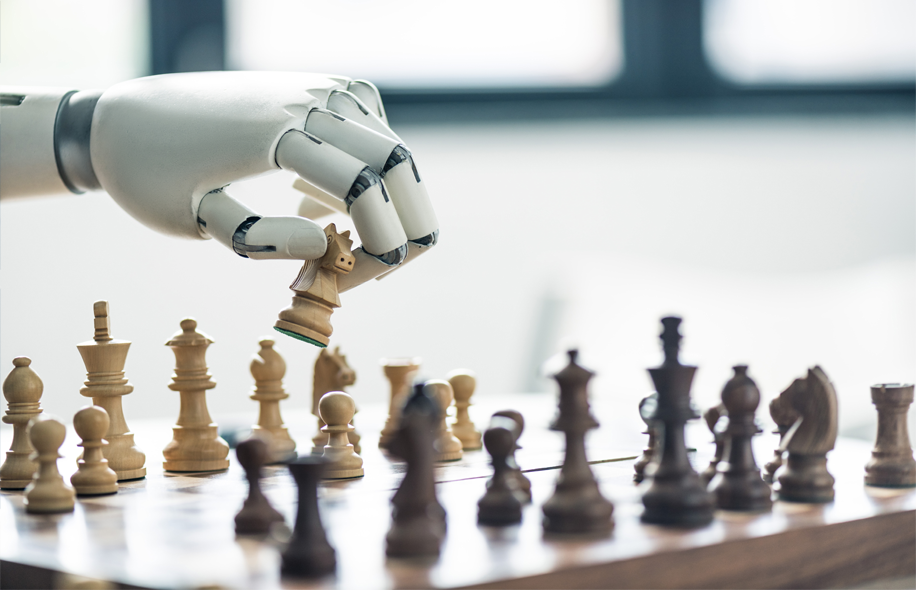Let’s face it, artificial intelligence or AI has been around a while.
Its one of those topics that generate contradictory feelings. On the one hand, we are impressed by the concept especially when we consider discussions on cognitive learning, cognitive computing and cognitive algorithms . We are enthusiastic about the opportunities AI can open up and its potential to influence all kind of aspects of our lives.
On the other hand, though, there is fear.
The movie industry has played a crucial role in not only familiarizing AI but also creating catastrophic images about artificial intelligence in the minds of the general public. Think movies like “Artificial Intelligence” starring Jude Law, “Terminator” with Arnold, “Her” with the not-at-all-robotic-voice from Scarlett Johansson and “Ex Machina” and you know what I mean!

The reality is that artificial intelligence is touching many sectors and our marketing sector, is one of them!
In this blog post, I will discuss most marketer´s hopes and fears about artificial intelligence and how it will influence our marketing decisions in the near future.
In a recent talk delivered by David Berkowitz during the IAB Conecta conference in Mexico City, David shared the results of a survey conducted amongst more than 200 marketing professionals regarding the role of artificial intelligence in marketing.
One of the questions in the survey was whether advertising agency managers would be replaced by robots. Only 3.9% of respondents thought that this job has a chance to be automated. Nevertheless, 17.5% of the respondents said that public relations specialists’ responsibilities would be automated.
So, digging deeper into the effect AI on marketers, here are some of the questions that have come up:
Firstly do marketers understand AI? According to the research only 46% seem to understand it.
Secondly are marketers investigating the full potential of AI? Again according to research only 36% of marketers have this high on their agenda.
Why do marketers want to invest in AI?
The top two answers were that marketers want to use AI to increase productivity and efficiency. I found this strange because in these top responses there were no findings specifically related to the sales or marketing function. Using AI to increase sales was lower on the scale! This raises the question of what should be the main concern for a marketer? If a marketer had increasing sales as their main goal, then the top reason for investing in AI should have been to increase sales. But marketers seem to be more concerned about efficiency, productivity, and innovations, than sales!
Interestingly we have had a similar experience in our agency here at WSI. We have been experimenting with artificial intelligence in the form of Chatbots.
We have recently added chatbots to our web pages to help us field questions from our web visitors. The initiative has yielded very positive results, particularly in terms of productivity and efficiency!
Although it is quite obvious that they are chatting with a robot, the visitors seam comfortable enough to engage this way in order to give us the information we need to best help them. Furthermore, applications like Chatpath and Drift can apply automated emails, set reminders for callbacks or even schedule meetings while you are away from the office.

Where would you most want AI applied to your organization?
The top answer was “customer service” with a number of marketers also choosing “competitive intelligence”.
Obviously, as AI starts embedding itself into an organization, many areas will benefit according to the surveyed marketers. The top benefit would be in analysis, research, strategy, and planning. Two other areas mentioned include media buying and media planning.
How long will it be before AI makes a significant impact on their marketing activity?
In answer to this question, 22% of markets estimated 5 years, 19% said 2 years, and 18% believed AI will start impacting marketing in 3 years. More importantly, 61% of the marketers surveyed responded that some roles would be replaced by AI.
Marketers are not the only ones who fear being replaced by AI. 29% of software developers are anxious that they could be replaced by AI as well.
So, how can marketers prepare themselves?
When facing this challenge, it is a good exercise to go back to the times when chess players were almost rock stars. Then a threat appeared in the form of Deep Blue, the computer program capable of playing chess. But the human race needs to be challenged to rise to new standards, and the advent of Deep Blue not only did not win over humans, but it also ended up creating better chess players! In fact, there are more than twice as many grandmasters now as there were when Deep Blue beat Kasparov!
Without any doubt, there will be marketing jobs that will be replaced by AI, but many others will also be created, as is already happening today. The difference between being replaced or being elected for the new roles is entirely a choice of each marketer. Some jobs are more prone to replacement by automation than others. Learning to configure, manage, operate, interpret and program AI platforms will be a highly demanded skill, but there is a price to pay: moving out of the comfort zone, learning the new technologies and take advantage of the opportunities.
For the next several years, technologies will augment what marketers can do, and all marketers should embrace them and become knowledgeable about them if they want to remain competitive and help their brands become competitive as well.
This article was inspired by my colleague Carlos Guzman. Carlos has been a member of the WSI community since 2004, he leads a digital marketing agency servicing Mexican and Latam clients. Carlos and his team specialise in social listening and analytics-based digital strategies.

Stay Connected